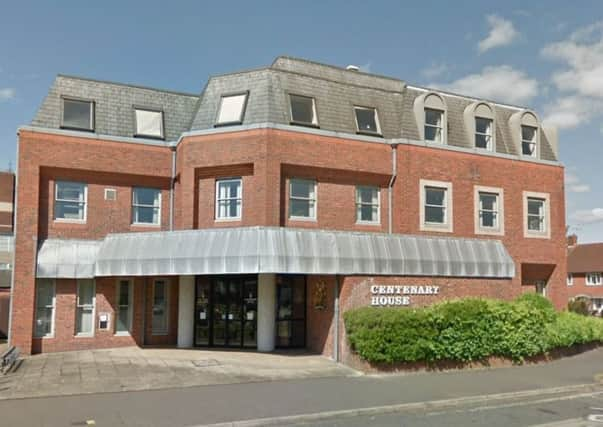Woman, 90, left on floor for days before death


Margaret Stemp, from Tonbridge, was found dead by a carer on her sister Joan Finlay’s kitchen floor, in Newtimber Avenue, Goring, on Thursday, December 28.
Ms Finlay, 97 – who had been hosting her sister over Christmas – was also found lying face down on the kitchen floor but was conscious and breathing.
Advertisement
Hide AdAdvertisement
Hide AdIt was thought the two sisters had been lying on the floor for approximately two days before they had been discovered, prompting concerns from West Sussex coroner Penelope Schofield about SECAmb’s safeguarding procedures.
An inquest, held on Monday (June 11), heard how Ms Finlay had fallen on December 23 before both sisters fell on Christmas Day but no ambulance had arrived on either occasions.
Ms Schofield said: “To me, it beggars belief that a woman dies after being left on the floor for a period of days.
“It is quite obvious the ambulance service was stretched but the call handler should have recognised the vulnerability of these two ladies.
“The ambulance service has let these people down.”
Advertisement
Hide AdAdvertisement
Hide AdThe inquest heard how Ms Finlay had fallen on December 23. Her carer Julie Ward called for an ambulance before cancelling it hours later after her, her husband, her son and a neighbour managed to pick the 97-year-old up off the floor.
Two days later, on Christmas Day, both sisters fell in Ms Finlay’s house at approximately 4.30pm before Ms Finlay managed to call Sussex Police for assistance.
The inquest was played a recording of a telephone conversation between a Sussex Police officer and SECAmb – thought to be from around 6.30pm on Christmas Day – in which the officer asked for an ambulance.
The police officer said Ms Finlay had told her neither women had any obvious injuries but Ms Stemp had recently undergone a hip operation.
Advertisement
Hide AdAdvertisement
Hide AdAt approximately 7.58pm, Sussex Police called SECAmb again to say they had received three more calls from Ms Finlay who said she was in ‘quite a bit of pain’.
At 8.56pm – approximately four and a half hours after the sisters fell – SECAmb called the home address and spoke directly to Ms Finlay who asked the call handler how long it would take an ambulance to arrive. The call handler said she could not give an estimated time but advised Ms Finlay if her symptoms got any worse, she must call 999.
Ms Finlay responded saying: “I don’t think my sister can get much worse. She has had a hip operation and I am in another room to her.”
The court then heard a recorded phone conversation between sergeant James Loader – who had visited Ms Finlay’s home at approximately 11.41pm on Christmas Day – and SECAmb.
Advertisement
Hide AdAdvertisement
Hide AdHe asked the call handler for an update who replied: “We will be as quick as we can but we are under exceptional demand at the minute.”
Sergeant Loader told the inquest how he and his colleague PC Erin Bushell picked both ladies off the floor and onto their feet. The officers said Ms Stemp was on the sofa and Ms Finlay was walking around before they left the property. Both officers agreed not to cancel the ambulance request.
At 2.06am, in the early hours of December 26, a call handler for SECAmb called the home address and spoke to Ms Finlay who said she had put her sister to bed and was about to get some sleep herself. She said they had waited too long for an ambulance and no longer needed it.
Ms Schofield added: “The police advised SECAmb they should still attend. The ambulance service should not then be taking the word of a 97-year-old lady at 2am that she did not require an ambulance.
Advertisement
Hide AdAdvertisement
Hide Ad“We rely on the ambulance service to protect the most vulnerable. We do not know whether (an ambulance attending the address) would have prevented this death and we will never know.”
No other calls were made between Ms Finlay and SECAmb until Mrs Ward called 999 having discovered the two ladies on the floor on the morning of December 28.
In the call, Mrs Ward said one woman was breathing but the other was ‘definitely dead’.
Ms Schofield said the ambulance service was under ‘extreme pressure’ on the night of December 25 and at 7.10pm had more than 150 calls outstanding.
Advertisement
Hide AdAdvertisement
Hide AdPhilip Tremewen, a safeguarding nursing consultant for SECAmb, was tasked with investigating the incident to determine whether the service could learn from it.
He said his investigation found ‘the demand at the time exceeded available resources, opportunities to provide more appropriate care were missed and the role of the support call operator was not appropriately trained to recognise changes in the patient’s condition’.
Returning her verdict, Ms Schofield said: “The deceased died from natural causes following a long lie on the floor with missed opportunities of medical intervention.
“I will be writing to SECAmb to review the practices to put in place safeguarding to prevent these incidents happening again in the future.
“I think we need to be sure that everything has been addressed to prevent another incident happening again.”